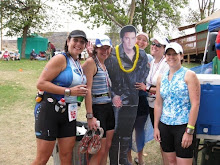I like the "Primed to Race" section at the bottom. I never know what to do for a running race warm-up!
How to Warmup Before a Run
Done before any workout or race, a proper warmup will help you achieve peak performance.
By Bob Cooper
From the November 2009 issue of Runner's World
It's easy to overlook the importance of a good warmup. After all, it's just the opening act before the real thing. But if you skip or skimp on your prerun routine, you risk poor performance and injury. "A proper warmup increases heart rate, breathing rate, and blood flow to the muscles," says Ann Alyanak, a University of Dayton coach who placed seventh at the 2008 U.S. Women's Olympic Marathon Trials. "It prepares the body for increasingly vigorous activity, allows it to work more efficiently, and reduces injury risk by loosening you up."
What makes a good warmup? It's a common question beginners ask, says Alyanak. If you're doing the same routine before every run and every race, you've already made your first mistake. Simply taking adequate time to warm up isn't enough—you have to match the level of preparation to the intended effort. For instance, the faster you'll be running or racing, the longer and more thoroughly you should warm up. But the effort shouldn't be so tiring that you wear yourself out before the starting line. Here's how to get ready for every kind of run.
EVERYDAY RUNS
Easy and moderately paced runs—and even those that start slow before picking up, such as progressive tempos—don't require much warmup. But they do require some movement to introduce your body to running, especially if you've just rolled out of bed, it's cold out, or you're achy.
WARMUP ROUTINE: Walk one or two blocks to loosen your muscles and joints. "When you do start running, start out really easy and gradually speed up until you're at your normal, easy-run pace," says Alyanak. "This usually takes about a half mile, but it can take longer if you're tired or sore."
SPEED SESSIONS
To prepare for the rigors of hard training sessions such as speedwork, you should ideally do a 20- to 40-minute warmup. Properly warmed up, you'll be able to hit your target paces from the outset of your repeats. "Most runners start speed sessions with an inadequate warmup," says Sean Coster, a coach and exercise physiologist for the Nike Bowerman Athletic Club in Beaverton, Oregon. The body is thus ill-prepared to adequately transport oxygen and offset the by-products of fast running, so it's harder to generate the power to run at goal pace, says Coster.
WARMUP ROUTINE: Walk for two minutes, then jog at a conversational pace for 15 to 20 minutes to raise your heart rate. Loosen and activate your muscles with five to 10 minutes of dynamic stretches and form drills such as lunges, skipping, and high-knees running. Then run 800 meters at moderate intensity (a little slower than your 10-K race pace), and do two to four 100-meter strides. Beginners or those pressed for time can eliminate the form drills and 800-meter run.
RACE DAY
With all the things you need to accomplish before your race starts—pick up your number, use the porta-potty, chat with friends—it's easy to shortchange your warmup. But you need time before your race to get your body ready for race pace. That's why Kane recommends arriving at least one hour before the start. "This gives you time to take care of everything, including a relaxed warmup, without going into panic mode," she says.
WARMUP ROUTINE: Get all the logistics out of the way at least 30 minutes before the start, then do a warmup suited to the distance you're racing (See "Primed to Race," below). Begin with easy jogging. Add in a few light stretches, and then do several 100-meter strides, accelerating smoothly to race pace.
*** Primed to Race ***
Generally, the distance of your event determines the length of your warmup. Shorter races such as 5-Ks and 10-Ks require longer warmups because you need to hit a faster pace right from the start. Marathoners and half-marathoners can use the first mile or two of the race to ease into goal pace. Here's how to match the warmup to the effort.
5-K
WALK OR JOG 15-30 minutes
STRIDES 8 x 100 meters
10-K
WALK OR JOG 10-15 minutes
STRIDES 6-8 x 100 meters
Half-Marathon
WALK OR JOG 10 minutes
STRIDES 4-6 x 100 meters
Marathon
WALK OR JOG 5-10 minutes; or first mile of the race
STRIDES 0-4 x 100 meters
RUN BETTER Before a race, perform part of your warmup, such as 100-meter strides or easy jogging, on the final stretch of the course so you can visualize finishing.
Subscribe to:
Post Comments (Atom)





















1 comment:
Thanks for a great article!
Post a Comment